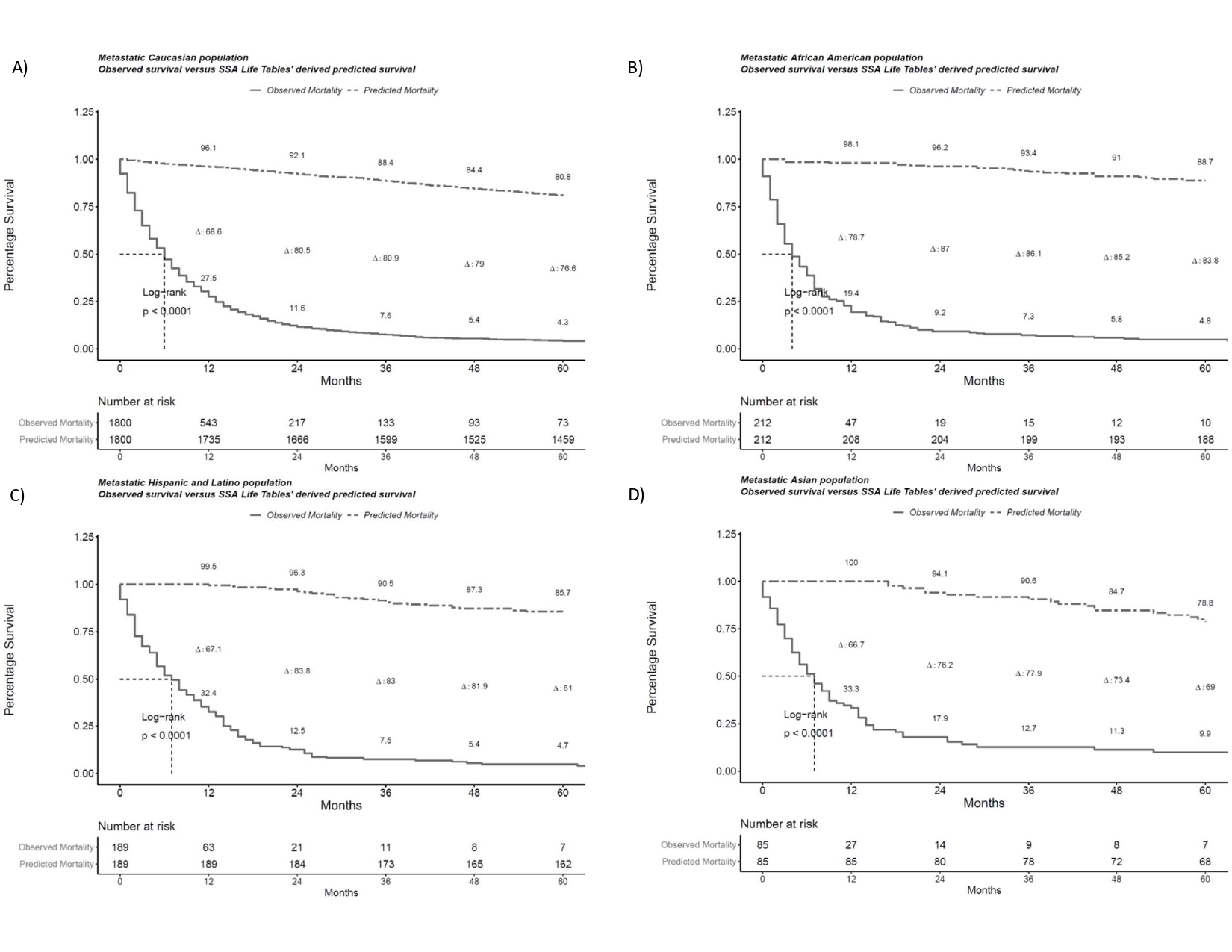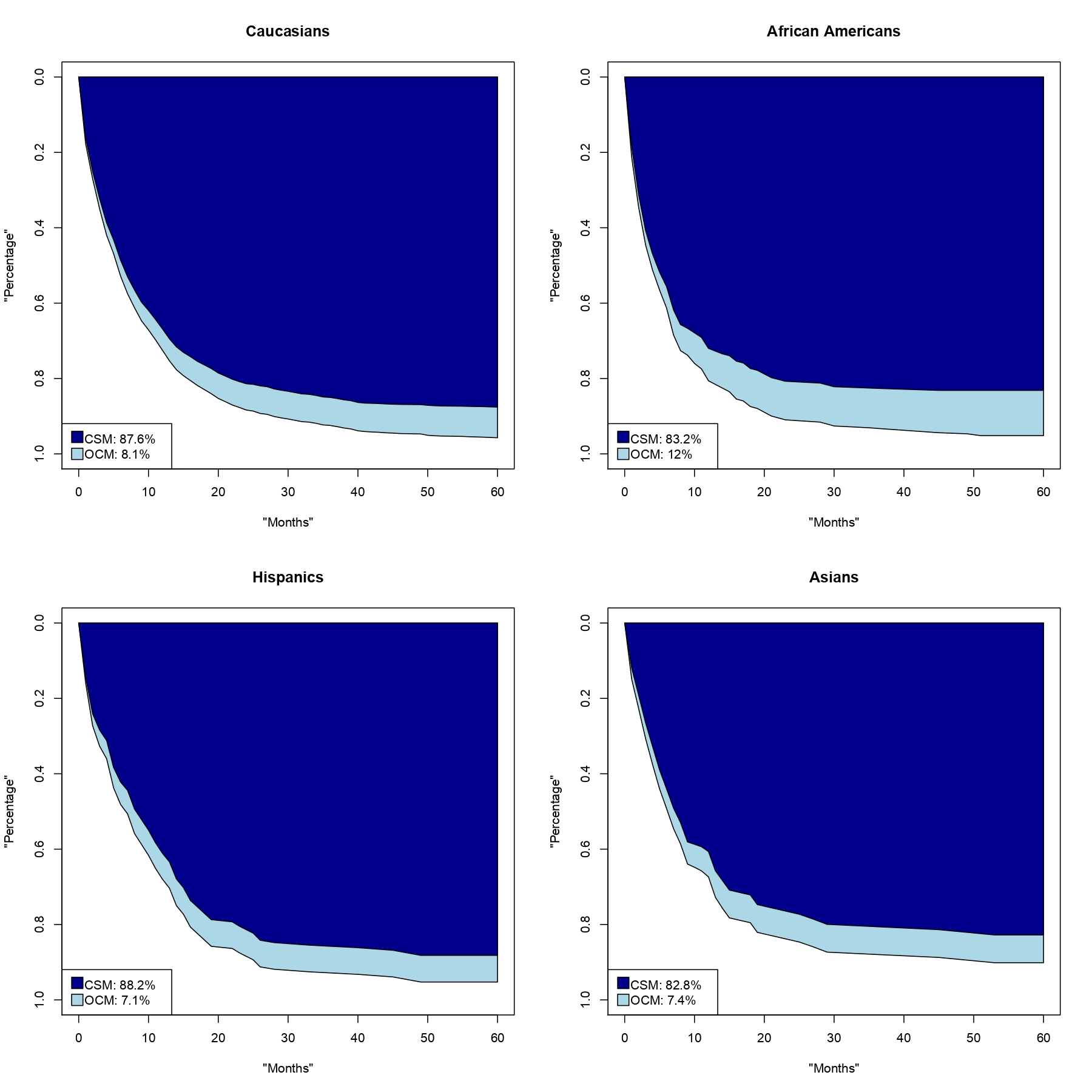Back
Poster, Podium & Video Sessions
MP03: Bladder Cancer: Invasive I
MP03-10: Life expectancy in metastatic urothelial bladder cancer patients according to race/ethnicity
Friday, May 13, 2022
7:00 AM – 8:15 AM
Location: Room 222
Francesco Chierigo*, Genova, Italy, Christoph Würnschimmel, Hamburg, Germany, Rocco Simone Flammia, Rome, Italy, Benedikt Horlemann, Montreal, Canada, Gabriele Sorce, Milan, Italy, Benedikt Hoeh, Frankfurt, Germany, Zhe Tian, Fred Saad, Montreal, Canada, Markus Graefen, Hamburg, Germany, Michele Gallucci, Rome, Italy, Alberto Briganti, Francesco Montorsi, Milan, Italy, Felix K.H. Chun, Frankfurt, Germany, Shahrokh F. Shariat, Vienna, Austria, Guglielmo Mantica, Maro Borghesi, Nazareno Suardi, Carlo Terrone, Genova, Italy, Pierre I Karakiewicz, Montreal, Canada

Francesco Chierigo
IRCCS Policlinico San Martino Hospital - University of Genova
Poster Presenter(s)
Introduction: To compare observed overall survival vs age-adjusted life-table (LT) derived life expectancy (LE) in metastatic urothelial bladder cancer (MBCa) patients according to race/ethnicity.
Methods: We identified Caucasian, African American, Hipanic/Latino and Asian metastatic urothelial bladder cancer patients from 2004 to 2011 within the Surveillance, Epidemiology and End Results database to. Social Security Administration tables were used to compute five-year LE. LT-derived LE was compared with observed overall survival OS. Additionally, we relied on Poisson regression plots to display cancer-specific mortality (CSM) relative to other-cause mortality (OCM) for each race/ethnicity.
Results: Overall, 2,286 MBCa patients were identified. Of those, 1,800 (79%) were Caucasian vs 212 (9.3%) African American vs 189 (8.3%) Hispanic/Latino vs 85 (3.7%) Asians. The median age at diagnosis was 71 years for Asians vs 70 for Caucasians vs 67 for Hispanic/Latinos vs 67 for African Americans. African Americans showed the biggest difference between observed OS and LT-predicted LE at five years (-83.8%), followed by Hispanic/Latinos (-81%), Caucasians (-77%) and Asian patients (-69%). In Poisson regression plots, Hispanic/Latinos displayed the highest cancer-specific mortality rate (88%), while African/Americans showed the highest other cause mortality rate (12%). Conversely, Asian patients displayed the lowest CSM rate (83%) and second-lowest OCM rate (7%).
Conclusions: African Americans showed the least favorable survival profile in MBCa, despite being youngest at diagnosis. Contrarily, Asians displayed the best survival profile in MBCa, despite being oldest at diagnosis.
Source of Funding: no funding


Methods: We identified Caucasian, African American, Hipanic/Latino and Asian metastatic urothelial bladder cancer patients from 2004 to 2011 within the Surveillance, Epidemiology and End Results database to. Social Security Administration tables were used to compute five-year LE. LT-derived LE was compared with observed overall survival OS. Additionally, we relied on Poisson regression plots to display cancer-specific mortality (CSM) relative to other-cause mortality (OCM) for each race/ethnicity.
Results: Overall, 2,286 MBCa patients were identified. Of those, 1,800 (79%) were Caucasian vs 212 (9.3%) African American vs 189 (8.3%) Hispanic/Latino vs 85 (3.7%) Asians. The median age at diagnosis was 71 years for Asians vs 70 for Caucasians vs 67 for Hispanic/Latinos vs 67 for African Americans. African Americans showed the biggest difference between observed OS and LT-predicted LE at five years (-83.8%), followed by Hispanic/Latinos (-81%), Caucasians (-77%) and Asian patients (-69%). In Poisson regression plots, Hispanic/Latinos displayed the highest cancer-specific mortality rate (88%), while African/Americans showed the highest other cause mortality rate (12%). Conversely, Asian patients displayed the lowest CSM rate (83%) and second-lowest OCM rate (7%).
Conclusions: African Americans showed the least favorable survival profile in MBCa, despite being youngest at diagnosis. Contrarily, Asians displayed the best survival profile in MBCa, despite being oldest at diagnosis.
Source of Funding: no funding



.jpg)
.jpg)